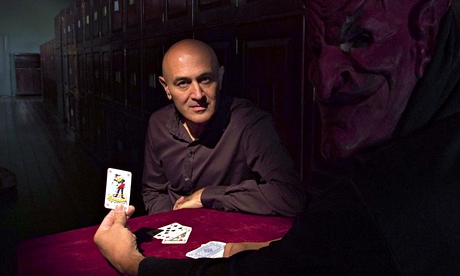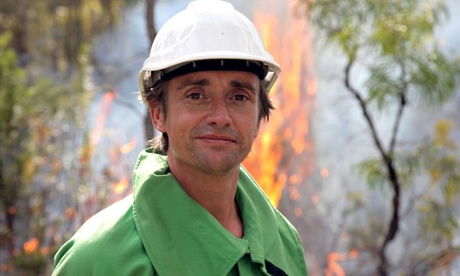Einstein was wrong. Apologies to the whole of science, but last night Professor Jim Al-Khalili OBE proved it to me right there on television.
Why aren’t small Victorian news-boys in flat caps shouting this abroad, while spinning front page headlines pirouette behind their heads? Why wasn’t the evening’s viewing interrupted with a special announcement?
In The Secrets of Quantum Physics (BBC4), Al-Khalili performed an exhaustive series of demonstrations, variously using coins, gloves and at one point cocktail paraphernalia, in order to come to his startling conclusion. For decades Einstein was at loggerheads with Danish physicist Niels Bohr about the nature of reality. “Does the moon cease to exist when I stop looking at it?” he sneered, in response to Bohr’s assertion that reality only existed when it was observed. But it turns out the answer is “Kind of, yes”.
Al-Khalili started us off gently, with some innocuous chat about the light emitted by the heated filament in a light bulb, but it wasn’t long before we were following him headlong down a rabbit hole of true scientific bewilderment. This was a bona fide head-breaker from start to sensational finish and I mean that in a good way. If any other channel had attempted to explain quantum mechanics to the layman (or woman) it would have undoubtedly involved friendly cartoon boffins, cheery graphics and an audience discussion about whether or not reality was objective, yes or no.
Press your buttons now.
In this show, an emphatic and engaging Al-Khalili performed his low-fi demonstrations with simple props, like a cross between Judith Hann and some increasingly crazed street magician with a firm hold on your sleeve, refusing to let go until you’ve understood him. “Everything we call real is made up of things that cannot be themselves regarded as real,” he said with no little glee, his face pressing into a fish-eye lens as though pushing at the fabric of reality itself. If his head had popped clean through the screen and rubbed noses with me I’d probably have gone with it. Nothing and everything made sense.
His experiments with light were the most directly engaging. In order to discuss light as a wave he jumped into the RNLI’s training tank in Dorset: the kind of treacherous, churning pool Peter Duncan would regularly hurl himself into for the entertainment and edification of amazed children. When discussing light as a collection of particles, he threw different-sized balls at a fairground tin-can display. The simplified visuals balanced perfectly with the complex concepts under discussion. They were visual liferafts in a thundering ocean of difficult ideas.
As the conceptual murk cleared, something he did with a coin started to actually go in, brain-wise. The coin is both heads and tails until it lands. A small chink of light burst into my consciousness at this utterance and was quickly gone, but it didn’t matter. It was enough to sustain me through another half an hour at least, at which point he sat down to a game of cards with the devil. The presence of the red rubber mask and its wordless inhabitant didn’t seem odd at all by this point. He really did play snap with someone dressed as a demon.
At one point in this Lynchian vision (this episode was actually called Einstein’s Nightmare) the professor wandered into a 1920s bar complete with extras dressed as flappers, sipping authentic jazz martinis. A waiter even served him a saucer of champagne, though at no point did he “pull a Worsley” and actually Charleston on to the floor in full tassels and feather boa, elbowing flappers hither and yon in a bid to illustrate the movement of light quanta. His focus was all on the physics, while the director clearly had fun with the pictures.
The next experiment was neatly cobbled together with props lying around on the bar. A cocktail shaker fired electrons at a cigar box lid through the gaps between three place cards. And something genuinely unexpected happened. Individual electrons behaved as though part of a wave, even when fired individually. How did they know?! The questions I was left with at the end of this hour were legion. They included “Can coins talk to each other?” and “Is the universe stacking the cards against me?” It wasn’t ideal viewing if you were hovering on the edge of existential meltdown.
This was television that provided a definitive answer and then threw up another 10 questions as a result, leaving viewers, whether experts or mere jaw-draggers (me), with a head full of wonder and a need to know more. As Bohr is thought to have said, “Anyone who is not shocked by quantum theory has not understood it.” Whatever Al-Khalili has to say in the second half of this odyssey, I’m sticking around to find out.











